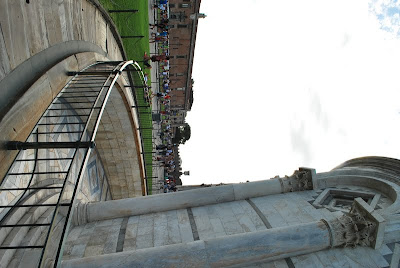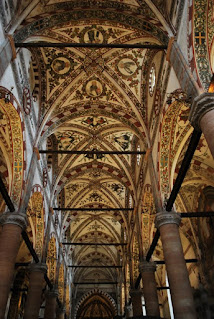Unlike other people, to me the name Verona doesn't conjure up the harrowing story of young love ending in death. It reminds me more of that 80s superstar, the king of death-defying stunts:
Dante Varona. And when I say his name I don't just say Dante Varona as if it were just
a name, I have to go Danteeeeeeee VARONA! Because dude, he's the bomb. And maybe there's still a little residue of his old movie jingle latching on hard in the dusty cobwebs littering my brain that holds a Pavlovian kind of power over me... Probably that.
But fair Verona was home to another Dante, the man whose visions of The Inferno inspired artists (my favorite is
this Bouguereau from Musee d'Orsay), and led many a Christian to fear sin - or pay the church handsomely to avoid hell. He was a native of beautiful Florence; and banished for his political leanings, he ended up in Verona. During exile, he was inspired to write The Divine Comedy.
Today he still stands over Signori Square, pensively surveying the souls that mill around Palazio Cangrande, his sanctuary in Verona. His patron, Cangrande della Scala (Latin for
ladder) was immortalized in Paradiso, thus:
Thine earliest refuge and thine earliest inn
Shall be the mighty Lombard's courtesy,
Who on the Ladder bears the holy bird
(Paradiso, XVII, v. 70)
 |
| The church of Santa Maria Antica |
The equestrian statue of Cangrande, ruler of Verona in the 14th century, still graces many monuments here. He was a leader of such authority (some say too much, actually) and wisdom that the Veronese still look upon him for protection.
In front of the della Scala palace Castelvecchio, at the peak of tourist season, tourists look more for souvenirs instead.
Also mentioned in Dante's Divine Comedy were two prominent families, from whose fatal loins sprung forth two star-cross'd lovers who would later figure in numerous Italian plays - only to reach true immortality in the hands of an English bard.
Come and behold Montecchi and Cappelletti,
Monaldi and Fillippeschi, careless man!
Those sad already, and these doubt-depressed!
(Purgatorio VI, vv.106-108)
The legend of
Giulietta e Romeo was already famous before Shakespeare's Romeo and Juliet turned their cautionary tale into the most famous love story on earth. The houses of the Montecchi and Cappelletti (anglicized to Montague and Capulet) still stand seven centuries after Mercutio
cursed their families to ruin.
The Capulet home is a lovers' mecca. Pilgrims write their names on the walls of the entrance in hopes that their love would be as enduring; though perhaps not necessarily as fatal.
Luckily, I had a pen with me so H scribbled our names in, too. If you ever go to Verona, you might want to look for us under all the graffiti.
This pastiche of colors is a collaborative artwork...
Made of chewing gum.
Wriggling our way through the crowd that was permanently fixed along the entryway, we finally made it to the courtyard to behold Juliet's famed balcony.
It was hardly as Franco Zeffirelli had
envisaged, but I'm sure it served its purpose well.
Under it, a crowd had also gathered around the statue of Juliet, whose breasts were noticeably shinier from the constant rubbing of visitors. There were a lot of people waiting their turn for a picture with her, and we waited along with the rest of the good-natured crowd. But there was a Pinay who popped in front of me, pulling her three children together and instructing them to jump on the statue as soon as the Japanese teens stepped off. I just hate when Pinoys lose their manners - I hold us to a higher standard! So I told her in Tagalog that she could go ahead of me because I'm cool with that - just to maybe make her realize she was rude to someone whom she didn't think understood what she was saying. But just as she opened her mouth to either gape or reply, I heard H calling me over. He was already holding on to Juliet's bronze breast.
Maybe I should have reminded him Juliet was 13 going on 14 when she married Romeo.
The Capulet courtyard can be booked for weddings too, now that the blood feuds have ended. (It would be messy if guys with swords started showing up at the ceremony,
no?) And I heard you could write to Juliet too, though I'm not sure how she could write back since she's busy being groped all day.
Verona is indeed romantic. In contrast with Milan, which is just as old, Verona did not turn in its past for the affectations of modernity. It reminded of Venice, in some respects. In fact our old friend from the water-logged city - St. Mark's lion - spreads its wings here too, just like in Venice.
And just like some quarters of Venice might come off as a bit kitschy, the streets of Verona that are overrun by tourists can seem a little tawdry - but the parts that are not have a spirit of authenticity.
And even though there were a lot of people, I didn't mind so much because I just had to look up, and they would conveniently disappear.
 |
| A fresco al fresco. |
 |
If I remember my history right - Romulus and Remus, I reckon?
For years, those names meant to me a sleazy massage place along EDSA. |
 |
| Owl be watching you. |
 |
| The Roman ampitheater |
While examining the facade of the Sta. Anastasia and crossing under the suspended sarcophagus of Guglielmo da Castelbarco (another powerful figure in Dante's time) to the left of the church, we heard an angelic voice hovering from above.
But the deceptively otherworldly voice was human after all. It was a woman singing Verdi, her voice floating from one of the rooms overlooking the square.
After a while, our wandering brought us to more peaceful segments of the city. Here, along the banks of the Adige river, was the Teatro Romano. Built in 1AD, it was the site of more refined entertainment -- while the larger amphitheater staged the more popular and accessible gladiatorial combats.
All that walking fed our imaginations, but when the time came to feed our tummies we had wandered too far from the center. By luck, we found this old osteria off the beaten track.
Their handwritten menu boasted of very few things, just a handful of traditional Italian fare, which is actually a good sign if you've seen at least one episode of Kitchen Nightmares.
It was here that we had the best lasagna of our lives.
I later found out that we dined in the best of the osterias in the medieval Sottoriva arcade -- which turned out to be among the most popular places to eat in Verona. (So much for off the beaten track!)
We were bursting from lunch, but we had one more mission to fulfill. While doing some pre-travel research on Verona, we found out this city had the best gelato in Italy. We were not about to leave without deciding for ourselves.
I guess the pictures speak for themselves.
Even while trying to sneak a pose with the gladiatrix and Xena, H couldn't put his cone down. That's commitment, y'all.
It was with a heavy heart that I left Verona, because I felt there was more for me to discover and more for me to love. The Bard was waiting at the gates with a sad reminder, that there is no world outside Verona's walls save for hell and torture... Although the whole schtick about death is a tad overreaching.
Hopefully, Verona's walls would open for me once again someday.
Up Next: O, Eto Pisa
Related Posts:
A Year in France Celebration (The Aftermath)
Sizzling Beach 1, Sizzling Beach 2, Sizzling Beach 3
Bella Italia 1, Bella Italia 2





































































